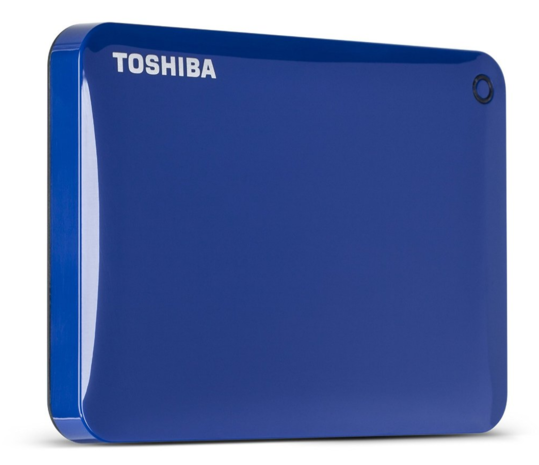Backup your files and increase your storage space with the Toshiba 1 TB Canvio Connect II Portable Hard Drive. It's easy to access your files when you are on. You can send a print job to any of the printers recognized by the print server feature. To set up a network printer, connect a USB cable to the printer and to the USB port on the back of your CANVIO HOME device. Page 47: Set Up A Private Share On Your Canvio® Home As A Network Storage Device.

Toshiba Canvio Connect II (2TB)
Editor Rating: Good (3.5)
Pros
- Personal cloud software included.
- Comes with NTFS driver for Mac.
- Compact.
- Available in several colors.
Cons
- Only 10GB of online cloud storage included.
- PC must remain on to use PogoPlug software.
- No 4TB option.
Bottom Line
The Toshiba Canvio Connect II is a pocket-size external hard drive with 2TB of storage space and premium features, like personal cloud software and color options, for less than $120.
If you want a portable external hard drive that's more than just a basic storage device, take a long look at the 2TB Toshiba Canvio Connect II ($114.99). The Canvio Connect II is not only a good backup drive, it also includes personal cloud software, Windows backup software, and it fits easily in a jeans pocket. It can't quite dethrone the current Editors' Choice Seagate Backup Plus Portable Drive (4TB) due to the latter's larger capacity, speed, and better value, but it's still a solid alternative.
Design and Features
The Canvio Connect II measures 0.77 by 3.07 by 4.29 inches (HWD) and weighs 8.1 ounces. It's a bit smaller than the 2TB Western Digital My Passport Ultra, although both have the same capacity.
How To Set Up Toshiba Canvio Connect Ii For Mac Free
The drive is available in five colors: black, blue, red, white, and the satin gold of our review unit. The metallic finish extends over five of the device's six sides, while the bottom panel is a matte white. The top of the drive has a circular activity light, and the back has a micro USB 3.0 port for the included USB cable.
SEE ALSO: Abhijit Bose appointed as country head of WhatsApp India
The 2TB of space is certainly enough to back up most desktops, and just about any current laptop. The drive is formatted for NTFS, and it comes with a NTFS driver for OS X. You have to reformat it for HFS+ if you want to use it with a Mac exclusively, or exFAT if you want to be able to write to the drive from both OS X and Windows without having to load a driver on either one.

NTI Backup Now EZ is bundled with the Canvio Connect II for backing up Windows PCs. It also comes with PogoPlug PC, which lets you host personal cloud services on your laptop or desktop. You have to keep your PC on to keep PogoPlug active, but then you can access the files on your Canvio Connect II via the Internet. Like the Toshiba Canvio Connect (750GB), this drive comes with 10GB of cloud storage on PogoPlug's online service. That's neat, but the competing Seagate Backup Plus Portable Drive comes with 200GB of Microsoft OneDrive online storage.
Other capacities are available for the Canvio Connect II, including 500GB ($64.99), 1TB ($74.99), and 3TB ($149.99). It comes with a two-year warranty, which is the same as the Seagate Backup Plus.
How To Set Up Toshiba Canvio Connect Ii For Mac Download
Performance and Cost
On our tests, the Canvio Connect II proved to be reasonably fast. It returned a good score of 5,566 points on the PCMark 05 hard drive test, 1,460 points on the PCMark 7 drive test, and took 13 seconds to copy our standard test folder. That's measurably slower than the Seagate Backup Plus Portable Drive, but a bit faster than the Adata HE720 and the Buffalo MiniStation Extreme NFC on the same tests.
How To Set Up Toshiba Canvio Connect Ii For Mac Windows 10
The drive is economical. At $114.99 for 2TB, its cost works out to $0.057 per gigabyte, which is significantly less expensive than the $0.065 per gigabyte of the Western Digital My Passport Ultra or the $0.13 per gigabyte of the Buffalo Ministation Extreme NFC. The latter drive does come with some security extras that justify the higher cost. That said, the current value champ is the Seagate Backup Plus Portable Drive, at $0.038 per gigabyte.
Conclusion
The Toshiba Canvio Connect II (2TB) has premium looks and features for a portable external hard drive. Its finish matches the many aluminum and magnesium-alloy laptops and tablets on the market, and it comes in a range of cool colors. The drive provides economical storage for your personal files and backups, and is reasonably fast while in operation. It also comes with personal cloud software, but only 10GB of space on Pogoplug's online service. It's a very good device, but it can't quite leapfrog the Seagate Backup Plus Portable Drive (4TB), our Editors' Choice for portable external drives, since the latter performed better in testing, and has a higher capacity and a lower cost per gigabyte.